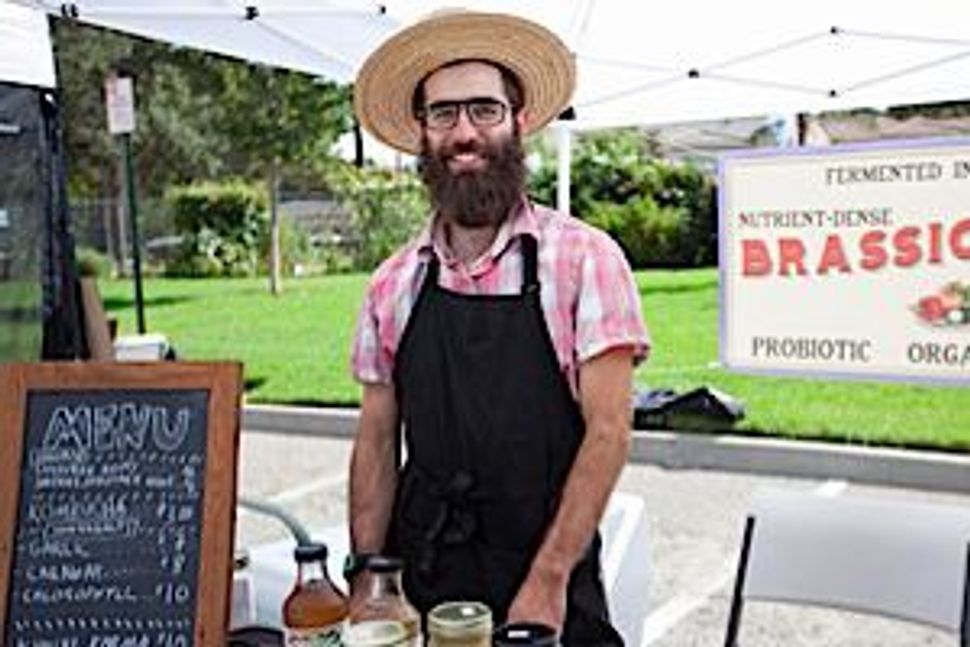LA’s Pickling Maven

Image by Courtesy of Brassica and Brine
Brassica and Brine isn’t a maritime law firm. But the Los Angeles company, which specializes in fermented vegetables, is judicious about preserving vegetables. Using produce sourced from local organic farmers, founder Uri Laio uses ancient, labor-intensive techniques to create kimchi, kraut, kombucha, pickled root veggies, and more. He’s earned a cult following in LA for an artisan spin on “lacto-fermentation”, a technique that supercharges both flavor and nutritional content. Laio, an Orthodox Jew, swapped law school for craft food production in 2010 after a stint on the Isabella Freedman Center’s Adamah Farm in Falls Village, CT. Adamah’s aim is to “cultivate the soil and the soul”; Laio’s own mission hews close to that ethos. “One of my goals in creating Brassica and Brine is to bring the most healing foods on earth into the Jewish community,” Laio, 29, told the Forward from Los Angeles. Brassica and Brine products, with their distinctive retro-cool labels, are available at LA foodie haven Farmshop, megamarket Western Kosher, and at local farmers’ markets. His full range is also available at Brassicaandbrine.com. Brassica, by the way, is the Latin name for cabbage.
Michael Kaminer: I’ve read that you developed a “fermentation obsession” after living on Adamah Farm — and that you found your “life’s passion” after a stint in a pickle shop. What fascinates you about fermentation?
Uri Laio: The alchemy… Fermentation is a living process where you take these very prosaic ingredients and they magically turn into this delicious, piquant, well-preserved, nutrient-dense food, without the use of heat or chemicals. In fact, supposedly humans were using fermentation as a tool before they were using fire, so I like to think that the fascination is woven into the very fabric of our DNA.
The techniques you use to make kimchi and sauerkraut have been described as “centuries-old.” How did you discover them?
I first learned traditional fermentation methods on Adamah Farm. I participated in the three-month Jewish Environmental Fellowship there in the summer of 2008, which was the first summer that Adamah was running a commercial sauerkraut and pickle operation. I was taught the essentials by Josh Rosenstein, who had been taught by some old-time sauerkraut makers. What can I say? The first time I tasted real traditional raw sauerkraut, I fell in love. Then I spent three months making sauerkraut, kimchi, and pickles on a small commercial scale which was my introduction to the commercial aspect of it. The rest is history.
Could you explain lacto-fermentation in layperson’s terms?
The first thing I tell people is that lacto-fermentation should not be confused with lactose, the milk sugar. The lacto-fermentation I do is a completely vegan/pareve process from beginning to end. ‘Lacto-fermentation’ is so named for the beneficial lactic acid bacteria naturally present in organic fruits and vegetables. Under the right conditions, they metabolize natural sugars and starches in the fruits and vegetables into lactic acid, enzymes, antioxidants, and vitamins. This is what gives sauerkraut its authentic flavor (not vinegar like most people believe). The bacteria also multiply exponentially. These same beneficial bacteria live symbiotically with us humans. A healthy adult has over 100 trillion of these bacteria in her gut alone. They help us digest food, absorb nutrients, regulate our immune system, and they even synthesize vitamins for us in our stomach.
Here’s a statement from Adamah’s web site: “Programs at Adamah integrate physical, social, spiritual, Jewish and ecological realms in order to inspire participants to a life of service — to the Jewish community and to the earth.” Are those same connections in your work with Brassica & Brine?
Yes, they definitely are. When I walk the aisles of the kosher grocery stores or eat in most of the kosher restaurants here in LA, all you see is junk, usually…I want to change that by making more healing foods accessible, and by educating people about their food. There is an amazing group of like-minded individuals here in LA with whom I’m networking. It’s a small group, but we’re passionate. For a number of years now I’ve also managed an online Yahoo! group called Nourishing Traditions — Kosher dedicated to disseminating knowledge and resources about healing foods for the kosher community.
Your products are kosher and pareve. Do you have a big Orthodox following?
Thank God more Orthodox Jews are discovering high quality fermented foods like raw sauerkraut. Right now [aside from Adamah Farms] I’m the only mainstream producer of kosher certified kimchi in the country, so I do get a good amount of orders from New York and New Jersey. My products just got into Western Kosher here in Los Angeles too. Just to put some perspective on how hungry the Orthodox community is for these foods, I dropped off my first order of kimchi to Western Kosher on a Monday, they put the jars on the shelves on Tuesday, and by Friday they called to tell me they were sold out.
Can you describe a typical day? Some of your preparations sound pretty time-intensive.
Honestly, in terms of making the sauerkraut it’s mostly a matter of waiting patiently for the microbes to work their magic. To check, chop, salt, and pack a batch of sauerkraut may only take a few hours, but the microbes work over the course of three, four weeks, or sometimes up to three months. I spend three days a week at farmers markets.
Which product is your favorite? Which has been most popular?
My personal favorite is the Kimchi Karma. It’s spicy with jalapenos, ginger, onions, garlic, and curry spices and goes great with almost everything I eat. The Kimchi Karma and The Four Thieves have been the most popular. The Four Thieves is my signature kraut. It’s named after a traditional European herb blend known as ‘The Four Thieves — lavender, sage, rosemary, and thyme — often infused with vinegar and believed to protect [against] the plague. It also happens to taste delicious infused in the sauerkraut.























